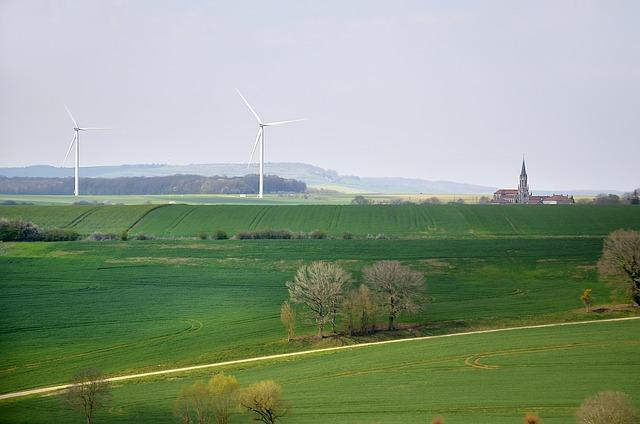In a significant development for the energy sector, French and U.S. companies have announced an ambitious plan to invest $10 billion in oil extraction off the coast of Suriname. This collaboration marks a pivotal moment for the South American nation, which is increasingly positioning itself as a key player in the global oil market. The partnership, involving major industry stakeholders, reflects a growing interest in the region’s untapped hydrocarbon resources and underscores the potential for economic growth in Suriname. As the venture unfolds, it promises not only to boost local economies but also to reshape the geopolitics of energy production in the Caribbean and beyond. This article delves into the implications of this investment, the companies involved, and the broader context of oil exploration in Suriname.
Investment Overview of the French and US Partnership in Suriname’s Oil Sector
The partnership between French and US companies marks a significant milestone in Suriname’s emergence as a vital player in the global oil market. With a staggering commitment of $10 billion, this collaboration aims to leverage advanced extraction technologies and expertise to tap into the abundant oil reserves located off the Surinamese coast. This investment not only promises substantial economic growth for Suriname but also aligns with the strategic interests of both nations in enhancing energy security.
Key aspects of this investment plan include:
Job Creation: The project is expected to generate thousands of direct and indirect jobs in Suriname, providing local communities with new economic opportunities.
Technological Advancement: French and US firms will introduce cutting-edge technologies that enhance oil recovery while minimizing environmental impact.
Infrastructure Development: Significant investments in infrastructure, including ports and pipelines, will be necessary to support the extraction and transportation of oil.
As both countries look to strengthen thier economic ties, the potential for increased energy exports from Suriname could transform its economy. The project is designed with sustainability in mind, emphasizing responsible extraction practices that balance economic benefits with environmental stewardship. In a context where global energy demands continue to evolve, the Surinamese oil sector is poised for promising growth, solidified by this landmark partnership.
Investment Highlights
Impact
Total Investment
$10 Billion
Employment Opportunities
Thousands of Jobs Created
Technological Integration
Advanced Oil Extraction Techniques
Environmental focus
Lasting Extraction Practices

Economic Implications of Suriname’s Oil Extraction for Local Communities
The recent decision by French and US companies to invest $10 billion in oil extraction off the coast of Suriname has raised significant economic implications for local communities. This influx of investment could lead to a range of benefits and challenges that will shape the future of these communities. Key areas of impact include:
Job Creation: The oil sector is expected to create thousands of jobs, ranging from technical positions to ancillary services. This could help considerably reduce unemployment in a region where economic opportunities are limited.
Infrastructure Development: The need for enhanced infrastructure—roads, ports, and utilities—could be accelerated due to oil extraction activities, benefiting local residents and businesses.
Local Business Growth: Increased investment may lead to a boost in local businesses, especially in sectors like catering, hospitality, and retail, which could cater to the demand generated by the oil industry.
However, the projected economic boons must be weighed against potential drawbacks. Concerns arise regarding environmental impacts, which could affect fishing and tourism—two staples of the local economy. Additionally, the risk of a phenomenon known as the “resource curse,” where dependency on oil can lead to economic volatility and social inequality, is a pressing concern.
To illuminate these dynamics, consider the following table that outlines some of the potential advantages and disadvantages of oil extraction for Suriname’s local communities:
Positive Impacts
Negative Impacts
Increased employment opportunities
Environmental degradation
Improved infrastructure
Economic dependency on oil
Support for local businesses
Social inequality and unrest
Balancing growth with sustainability and equity will be vital as Suriname navigates this pivotal moment in its economic development. Engaging local communities in decision-making processes will be crucial to ensure that the benefits of oil extraction are felt widely and responsibly.

Environmental Considerations in offshore Drilling Initiatives
As French and US companies prepare to allocate $10 billion towards oil extraction off the coast of Suriname, environmental considerations must remain at the forefront. Offshore drilling has the potential to boost local economies and energy security, yet the risks to marine ecosystems and coastal communities are significant. It is essential to adopt a nuanced approach that balances economic growth with the preservation of natural habitats.
The potential environmental impacts associated with offshore drilling initiatives include:
Oil Spills: accidental releases can have devastating effects on marine life,and clean-up efforts often prove inadequate.
Seismic Surveys: The noise from seismic testing can disrupt marine mammals, leading to disorientation and potential strandings.
water Quality: drilling fluids and other discharges pose a risk to surrounding water quality, affecting both aquatic life and human populations.
Habitat Destruction: Physical alterations to the seabed can disrupt local ecosystems and displace wildlife.
To mitigate these risks, it is vital for companies involved to incorporate strict environmental management practices and invest in innovative technologies designed to minimize unintended consequences. As part of the investment strategy,the following measures should be considered:
Mitigation Measure
Description
Robust Spill Response Plans
Implement thorough protocols for rapid response to oil spills,minimizing ecological harm.
Environmental Impact Assessments
conduct thorough assessments prior to drilling to understand potential effects on the environment.
Community Engagement
Involve local communities in discussions to address concerns and ensure transparency.
Recognizing the intricate relationship between energy development and environmental stewardship will be crucial for the success of these initiatives. Engaging with environmentalists, local communities, and regulatory bodies will foster a more sustainable approach that aims to safeguard both economic interests and the rich biodiversity present off the coast of Suriname.

Strategic Recommendations for Sustainable Oil Development in Suriname
As suriname prepares to welcome significant investments from French and US companies, strategic recommendations for sustainable oil development are crucial to maximize economic benefits while minimizing environmental impact. A robust framework must be established to govern the extraction processes, ensuring that local communities and ecosystems are prioritized.
Key strategies may include:
Environmental Impact Assessments: Prior to project initiation, comprehensive evaluations should be mandated to assess potential ecological consequences, requiring companies to implement mitigating measures.
Community Engagement Programs: Fostering partnerships with local communities is essential. Involving stakeholders in decision-making can enhance transparency and build trust.
Investment in Renewable Energy Diversification: A portion of profits should be allocated towards developing renewable energy initiatives, ensuring a gradual transition away from fossil fuels.
Capacity Building and Education: Providing training and resources for local workers will not only boost employment but also equip the community with the skills necessary for a sustainable future in the energy sector.
Moreover,implementing regulatory frameworks that comply with international sustainability standards is imperative. By promoting transparency and accountability, Suriname can attract responsible investments while preserving its rich biodiversity. The establishment of an independent oversight body may further enhance project governance, ensuring adherence to both environmental and social guidelines.
to track progress and effectiveness, a monitoring and evaluation system is necessary. This system could be structured as follows:
Monitoring Aspect
Frequency
Stakeholders Involved
Environmental Health Assessments
Bi-annual
Government, NGOs, Community Representatives
Socio-Economic Impact Surveys
Annual
Research Institutions, Local authorities
Compliance Audits
Quarterly
Independent Auditors, Investors
by adopting these strategic recommendations, suriname can ensure that the influx of investment contributes positively to the nation’s economy while preserving its environmental integrity for future generations.

Global Energy Market Impact of Increased Oil Production from Suriname
The recent commitment of over $10 billion from French and US companies to extract oil off the coast of Suriname could significantly influence the global energy market. Suriname, a relatively new player in the oil industry, is poised to shift energy dynamics, particularly in the Caribbean and South American regions. This surge in oil production could lead to a decrease in dependence on other oil-exporting nations, especially as Suriname’s strategies align with sustainable practices and exploration initiatives that capitalize on its offshore reserves.
As Suriname enhances its oil production capabilities, several potential impacts on the global energy market may arise:
Price Fluctuations: Increased oil output may lead to lower crude oil prices globally, affecting economies reliant on oil exports.
Shifts in Trade Patterns: Suriname’s entry into the oil market can change existing trade relationships,as countries may seek to diversify their energy imports.
Investment Trends: The influx of investments from major international companies may attract further investments in infrastructure and technology in Suriname and surrounding regions.
To understand the broader implications, consider the following table that summarizes key factors influencing the global market post-investment:
Factor
Impact
Oil Price Stability
Potential decline in prices due to increased supply.
Regional Supply
Suriname may emerge as a new oil hub in the Caribbean.
Environmental Considerations
Greater focus on sustainable extraction methods.
Geopolitical Influence
Adjustment in relationships among oil-exporting nations.
The long-term implications of this investment will depend on the effectiveness of operational strategies deployed by the involved companies and their ability to navigate both the economic and environmental challenges ahead. Suriname’s emergence as a oil-producing country symbolizes not just a local chance but a catalyst for broader shifts in energy policies and market strategies worldwide.

Regulatory Frameworks and Their Role in Encouraging Responsible Investment
The ongoing investments by French and American companies in suriname demonstrate a pivotal shift in global energy strategies, particularly in the context of climate change and sustainable practices. Regulatory frameworks play a critical role in shaping these investments by establishing guidelines that balance economic growth with environmental protection. In both the United states and France, stringent regulations govern oil extraction to mitigate ecological impacts, ensure worker safety, and promote community engagement.
In the context of Suriname, the following key regulatory factors are essential for fostering responsible investment:
Environmental Compliance: Regulations require companies to conduct Environmental Impact Assessments (EIAs) before drilling, ensuring that potential harms to ecosystems are assessed and mitigated.
Clear Reporting: Legislation mandates regular disclosures related to operational impacts, which enhances accountability and builds public trust.
Community Engagement Standards: Investors are encouraged to include local communities in decision-making processes,fostering collaboration and ensuring that the benefits of extraction are felt by the people living in the affected areas.
Climate Goals Alignment: Regulatory frameworks are increasingly aligning investment practices with national and international climate goals, urging companies to commit to sustainable practices.
In addition, international agreements can further enhance local regulations by promoting best practices and setting standards that transcend national borders. This interconnected approach not only attracts responsible investment but also ensures that such investments contribute to a more sustainable and equitable economic landscape.
Aspect
Details
investment Amount
$10 billion
Involved Parties
French and US Companies
Location
Off Suriname’s Coast
Regulatory Goals
Sustainability and Responsibility

the Way Forward
the major investment of $10 billion by French and American oil companies marks a significant milestone in the burgeoning energy sector off the coast of Suriname. As the country seeks to position itself as a competitive player in the global oil market, this development not only underscores the growing interest in Suriname’s untapped resources but also highlights the strategic partnerships between nations in the energy arena. As exploration and extraction activities ramp up, all eyes will be on Suriname to see how this venture unfolds, its economic implications for the region, and the potential impact on environmental concerns. the coming years will be pivotal in determining the balance between energy development and sustainable practices as Suriname navigates its path forward in the global energy landscape.
—-
Author : Isabella Rossi
Publish date : 2025-03-17 22:51:50
Copyright for syndicated content belongs to the linked Source.